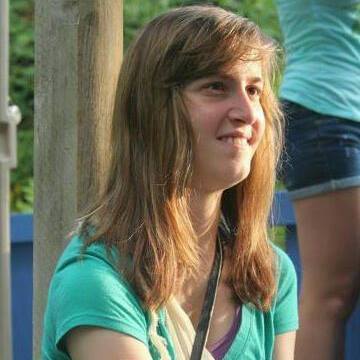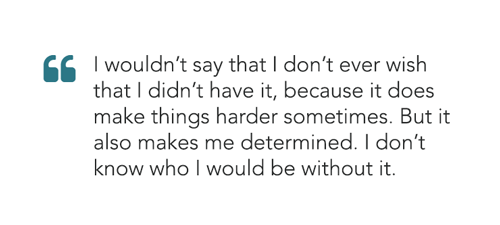Navigating the road to adulthood with cerebral palsy
CP-NET Community Profile: Georgia Beauchemin
Mohawk College Student & CP-NET Stakeholder Advisory Committee Member
At 21 years old, Georgia Beauchemin balances full-time studies at Mohawk College, friends, family and an active sports and volunteer schedule. She also has cerebral palsy. Inspired by a course taken during the Recreational Therapy diploma program she completed earlier this year, Georgia is now pursuing a graduate certificate in Concurrent Disorders. “I’m planning to make the most of my life!” she says.

Georgia recalls a time when her outlook on life wasn’t as sunny. The road from adolescence to young adulthood is often bumpy, as young people explore who they are and how they fit into their world. Navigating this transition with a disability can add yet another layer of complexity. “As a young teenager, I was very angry about my disability”, she recalls. “I felt it made me different from other people and I didn’t want anyone to know about it. It got to the point where I would not wear my hearing aids to school because I was afraid of people noticing that I had them”.
It wasn’t until her final year of high school that she began to see the ways in which having cerebral palsy had positively influenced her life. “I wouldn’t say that I don’t ever wish that I didn’t have it, because it does make things harder sometimes. But it also makes me determined. I don’t know who I would be without it.”
Looking back, Georgia can identify several people and supports who helped her along the way. The friendship and community she found at the Mackay Centre School, a Montreal school for children with disabilities, continues to influence how she views herself and others today. “I approach life with a love of people”, she says. “I’m not skeptical and I try not to discriminate.” As high school drew to a close, a summer camp offered by the Children’s Developmental Rehabilitation Program at Chedoke Hospital helped her practice life skills and increased her confidence in her ability to live independently. Her family is also very supportive. “Maybe too supportive”, Georgia laughs.

As an adult, she finds that supports and programs are still available but she must be proactive in accessing them. She sometimes struggles with asking for help, and strongly believes that self-advocacy is a skill that should be included in the high school curriculum. “Things are not done for you in college the way they are in high school. You definitely need to have those tools in your belt.”
Georgia hopes her experiences will one day assist her in supporting young people with disabilities as they forge their own self-identities and confidence. In particular, she dreams of returning to the school that played such an important role in her youth. “Mackay Centre School helped me be who I am. I would love to be involved because it made such a huge difference in my own life!”
When asked what she would say if she could pass on just one message to her teenage self, Georgia thinks long and hard. “I’d tell myself to roll with the punches.” she says. “Be aware that you will end up in a place that you are happy.”
